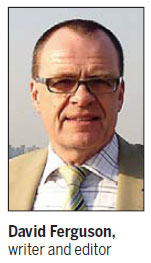
 'Taken 2' grabs movie box office crown
'Taken 2' grabs movie box office crown
 Rihanna's 'Diamonds' tops UK pop chart
Rihanna's 'Diamonds' tops UK pop chart
 Fans get look at vintage Rolling Stones
Fans get look at vintage Rolling Stones
 Celebrities attend Power of Women event
Celebrities attend Power of Women event
 Ang Lee breaks 'every rule' to make unlikely new Life of Pi film
Ang Lee breaks 'every rule' to make unlikely new Life of Pi film
 Rihanna almost thrown out of nightclub
Rihanna almost thrown out of nightclub
 'Dark Knight' wins weekend box office
'Dark Knight' wins weekend box office
 'Total Recall' stars gather in Beverly Hills
'Total Recall' stars gather in Beverly Hills
A Scot's take on Suzhou
Updated: 2012-04-18 09:18
By Yang Guang (China Daily)
|
||||||||

China was never on the radar of Scottish management consultant David Ferguson until he married a Chinese lady and decided to move to China to look for a change. He had reached a bottleneck in business in 2006.
Six years later, writer and editor Ferguson has three books on China under his belt. His most recent offering, In Red Embroidered Shoes: Sipping the Essence of Suzhou, was launched at the London Book Fair on April 17.
The book is part of the "Cities of China" series - a bilingual project focusing on the country's second-and-third tier cities - brought out by Foreign Languages Press (FLP).
"I have tried to provide readers with a flavor of Suzhou, something to whet their appetite and encourage them to find out more for themselves, preferably by coming to visit in person," the 56-year-old says. "Those who do will not be disappointed."
Ferguson set off on his three-week visit to Suzhou, a small city in Jiangsu province located just to the west of Shanghai, in November 2011.
As a Scot he could readily identify with many aspects of the city - a small place overshadowed somewhat by a bigger and more illustrious neighbor, but having a long history of its own marked by political significance, military distinction and notable achievements in an enormous range of fields.
He describes his visit as "something of a butterfly flight" - "random fluttering in no particular direction, and sporadic stops to settle on a particular flower and take a sip".
"Not a single day passed without some unexpected gem presenting itself for inspection," he says.
He visited historical museums and held a priceless Yuan Dynasty (1271-1368) vase in his trembling fingers, was shown round the only private classical garden to be created in the city since the fall of the last Qing Dynasty (1644-1911) emperor, interviewed one of the leading Kunqu Opera artists, had dinner with the entrepreneur who created the Yangcheng Lake crab farming industry, and talked with university students.
For Ferguson, the best thing about the city is that one can taste "the best of both sides of China". Quiet, modest and timeless old Suzhou provides a genuine feel of what Chinese cities were like hundreds of years ago. At the same time there is also the modern, daring and vibrant new Suzhou represented by the Suzhou Industrial Park, a joint-venture development zone between China and Singapore that dates back to the early 1990s.
"The two sides are not in conflict with each other," he says. "The city manages to blend them and make them complement each other."
After unsuccessfully trying his hand at business when he first moved to China, Ferguson was offered a job as a journalist with the web-based news provider China.org in 2008.
"I had reservations about working in the media in China," he says, "because in the West, the media in China has a negative reputation."
To bring in a sense of balance, he decided to take the job with China.org. He was the first foreign journalist working with the Chinese media to be reporting from ground zero just five days after the tragic Wenchuan Earthquake in 2008 struck.
"I will never forget the courage and resilience of the survivors, the determination and stamina of the relief workers, and the remarkable degree of organization in the response of the authorities," he remembers.
His visit to six of the nine Pearl River Delta cities in Guangdong province was an eye-opener. Ferguson could see for himself that western perceptions of the Chinese economy were often completely biased. It was still seen as buttressed on making cheap plastic toys for the export market.
"It might have been true 15 years ago," he says. "It is not even close to being true now."
He cites Songshan Lake Hi-tech Industrial Park in Dongguan as an example - clean, green and hosting some of the most innovative and ambitious companies from China and the rest of the world.
"I have tried to present a picture of what is really happening that is different from what Western readers believe or hear are happening," he says. "What a place - with so much happening everywhere, so much effort being expended to transform Guangdong into a place where anyone would be proud to live and work."
He moved to FLP in 2010. His first two books are also parts of the "Cities of China" series: one features Nantong in Jiangsu province - the first modern city built and developed by the Chinese; the other presents the economic and social transformation project under way in Guangdong province.
yangguang@chinadaily.com.cn
Most Viewed
Editor's Picks

|

|

|

|

|

|
Today's Top News
Health new priority for quake zone
Xi meets US top military officer
Japan's boats driven out of Diaoyu
China mulls online shopping legislation
Bird flu death toll rises to 22
Putin appoints new ambassador to China
Japanese ships blocked from Diaoyu Islands
Inspired by Guan, more Chinese pick up golf
US Weekly

|

|






